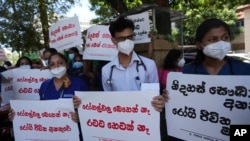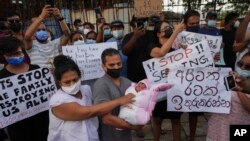President Gotabaya Rajapaksa of Sri Lanka has revoked a state of emergency order amid an economic crisis that triggered street protests and political upheaval posing a threat to his rule.
President Rajapaksa issued the order last week after demonstrations demanding his resignation outside his home in the capital, Colombo. The decree had given police the power to make arrests without warrants and made it illegal for people to leave their homes.
The president lifted the emergency decree Tuesday, shortly after 41 lawmakers abandoned the ruling coalition and became independent, leaving Rajapaksa’s party short of the 113 members needed to maintain its majority in Sri Lanka’s single-chamber parliament.
The mass resignations occurred two days after Rajapaksa’s entire 26-member Cabinet quit, including his brother, Basil, who served as finance minister, leaving only the president and another brother, Prime Minister Mahinda Rajapaksa, in charge. Gotabaya Rajapaksa’s offer to all political parties to form a unity government was rejected Monday.
Sri Lanka’s economy has been battered by the coronavirus pandemic, which has crippled its tourism industry. The South Asian island nation is also struggling under the weight of heavy debt and declining foreign reserves that have created food and fuel shortages that led to power blackouts up to 13 hours a day.
The crisis has marred the second hold on power for the Rajapaksa family this century. Mahinda was president and Gotabaya defense minister when Sri Lanka’s long civil war between the government and Tamil rebels ended in 2009. The brothers were accused of carrying out war crimes and other human rights abuses during Mahinda’s 2005-15 tenure.
Some information for this report came from The Associated Press and Reuters.






